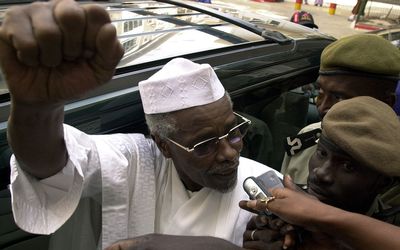PBS: Escaping Eritrea … [Read More...] about ካብ ውሽጢ ቤት ማእሰርታት ኤርትራ
Habre’s rise from war specialist to dictator
Agency Staff | May 31 2016 | Business Day

A DESERT warfare specialist, Chad’s Hissene Habre seized power in 1982 and quickly embraced the role of remorseless dictator, with brutal repression the hallmark of his eight-year reign of terror. Often dressed in combat fatigues that complemented his “desert fighter” nickname, Habre fled to Senegal after he was ousted by Chad’s current President Idriss Deby in 1990. Now 73, Habre’s rule was marked by fierce crackdowns on dissent, including torture and executions of opponents, earning him comparisons to Chilean dictator Augusto Pinochet.
Habre was handed a life prison sentence in his trial in Dakar for crimes against humanity, war crimes and torture yesterday.
Investigators found that more than 40,000 people were killed during his rule. The son of a farmer, Habre was born on August 13 1942 in Faya-Largeau, northern Chad, and grew up among nomads in the Djourab desert. His intelligence landed him a job as a local official before he left for Paris in 1963 to study law and attend Sciences-Po, a prestigious political science school. One of his influences at the time was Ernesto “Che” Guevara.
Habre joined the Chad National Liberation Front a year after returning home in 1971 and became its leader, before breaking away to form another rebel group, the Northern Armed Forces (FAN). Habre made newspaper headlines in 1974, when he kidnapped a French ethnologist. She was held for three years before France agreed to terms for her release.
A staunch nationalist, Habre then served as prime minister in the government of president Felix Malloum and as defence minister under his sometime ally, Goukouni Weddeye who later became president. Habre, unlike Weddeye, was an outspoken opponent of Libyan leader Muammar Gaddafi and the relationship did not last. Habre broke from his Tripoli-backed ally just months after the formation of Weddeye’s 1979 government, triggering violence in Chad’s capital, N’Djamena.
Habre fled the city for eastern Chad in 1980, but returned to fight his way to power in 1982. During his rule, opponents — real or imagined — were arrested, tortured and often executed by the Documentation and Security Directorate, Chad’s secret police. Habre’s reign ended as dramatically as it had begun, when Deby, a formerly loyal general, led a rebel force that drove him from power and into exile in Senegal.
The former dictator lived freely for more than 20 years in an upmarket Dakar suburb with his wife and children, swopping his military garb for white robes. He was considered a pious Muslim who helped finance the construction of several mosques. US lawyer Reed Brody, who investigated Habre’s regime for Human Rights Watch, said the former dictator took the precaution of “emptying the coffers” before leaving Chad and built up a “protection network” in Senegal.
In his 2014 memoirs, then-president Abdou Diouf said it was a battle to convince Habre to return the Chadian state-owned aircraft that had flown him to Dakar. The AU mandated Senegal to try Habre in July 2006, but President Abdoulaye Wade delayed the process for years despite an agreement to create a special court for the process.
Belgium also sought his arrest over allegations of war crimes and crimes against humanity after three Belgian nationals of Chadian origin filed a suit in 2000 for mass murder, arbitrary arrest and torture during his regime. Belgium issued an arrest warrant for him in September 2005, and he was arrested in Senegal shortly after, but the African country said its courts did not have the jurisdiction to rule on a Belgian extradition request.
Habre was arrested again in Dakar on June 30 2013 and the AU decided his trial should take place there, making Habre the first African leader accused of atrocities to face justice in another African country rather than in an international court.
